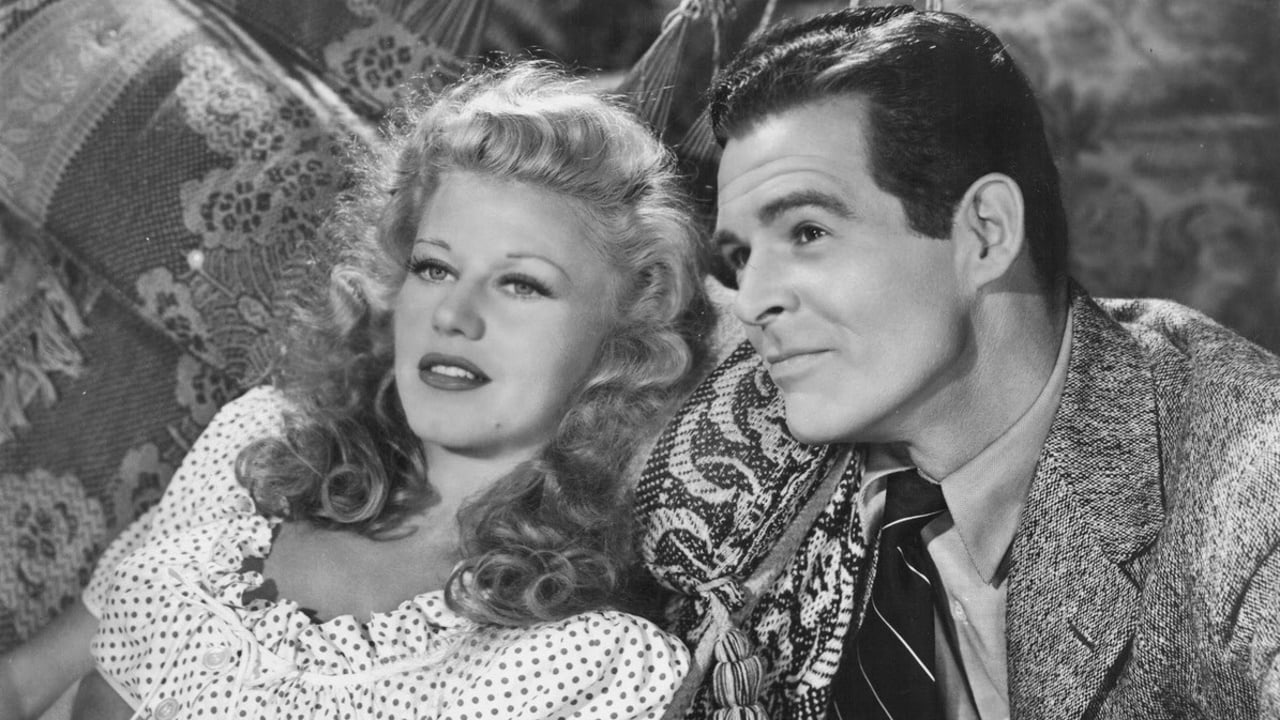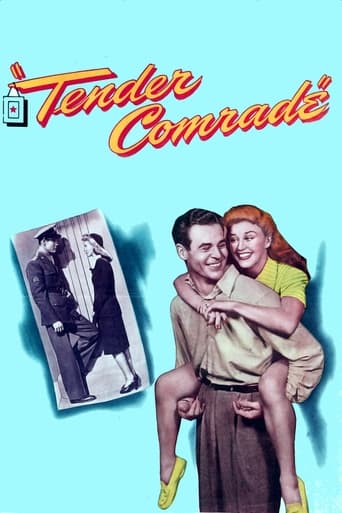




I like the storyline of this show,it attract me so much
View MoreIt's easily one of the freshest, sharpest and most enjoyable films of this year.
View MoreThis is a coming of age storyline that you've seen in one form or another for decades. It takes a truly unique voice to make yet another one worth watching.
View MoreThe story, direction, characters, and writing/dialogue is akin to taking a tranquilizer shot to the neck, but everything else was so well done.
View MoreA great film about a small world, the reality of four young wives with their husbands out in the war, sharing a common household to minimize expenses but not managing very well, so they hire a housemaid, who happens to come from Dresden, Germany, with fresh experience of the nastiness of the nazism that murdered that democracy. Yes, there is much war propaganda here, the year was 1943, so it was inevitable, but just forget it, and concentrate on the excellent direction of Edward Dmytryk (as usual) in bringing to life the reality of these soldiers' wives, one of them being Ginger Rogers (for once without any song or dance) and her husband being Robert Ryan as young and fresh and handsome as Gregory Peck. The best scenes are flashbacks of their marriage before the war, which gives a very intimate and interesting insight into the art of direction by Edward Dmytryk. He must have had an expert hand with women.And that's not all. The script is by a young and early Dalton Trumbo, later one of the best script writers of Hollywood after Ben Hecht, and the music adds to it as well. It's almost all domestic scenes inside the common house of the five dames, but it is outstanding as a chamber play. Some get their husbands back from the war, others do not. It is a unique film in its sensitivity of rendering the reality of soldiers' wives some justice and intimate documentation.
View MoreReleased in 1943/1944, "Tender Comrade" gets its title from a poem called "My Wife", by Robert Louis Stevenson, which glowingly lists the wonderful traits of his wife. The first line of the third stanza reads: "Teacher, tender, comrade, wife". Note the comma that separates the words "tender" and "comrade". He was not describing a comrade who is tender, but a comrade who also tends.The film starts with written lines from the poem, then graphically extracts the two words of the title. Were they trying to honor Stevenson with their attribution? Or were they trying to make it clear that the word "comrade" was not an overt effort to allude to the common communistic sobriquet? Regardless, given the overreaching sophistry of those who found communist tendencies everywhere, it is a wonder someone didn't find guilt by association, given Stevenson's atheism and his socialist leanings.The film is written by Dalton Trumbo--one of the best screenwriters of all time. Author of the great anti-war novel, "Johnny Got His Gun", Trumbo also authored the screenplays for "Exodus", "Spartacus", and "Roman Holiday". He was awarded two Oscars.Trumbo joined the Communist Party in 1943. It was not illegal to do so and at the time, Russia was an ally of the U.S. in WWII. Clearly, Trumbo was anti-fascist. Was he anti-American in any way? An examination of the film may clarify his views.The story of the film, like most of its time, is clearly aligned with war efforts on the homefront and includes much of the patriotic propaganda that was prevalent. As you might guess, with a title that refers to wives, "Tender Comrade" focuses on the wartime lives of wives whose husbands are serving in the military.Four women who work in the Douglas aircraft plant a la Rosie the Riveter, decide to combine their meager paychecks so that they can afford a larger home and achieve greater purchasing power. They hire a German housekeeper, whose husband is also serving in the U.S. armed forces. The entire film is written from their perspectives, but especially from the perspective of the main character, Jo Jones (Ginger Rogers). Throughout the film, via Jo's flashbacks, we are taken back to moments in her life with her husband, Chris (Robert Ryan).Interestingly, the moments Jo reflects on are not all moments of great joy. In fact, they show that the relationship of the young couple, though loving, was full of disharmony and arguments, even when he proposed to her. Nevertheless, Jo is dedicated to the homefront support of her husband and all the troops. She, more than any of the other wives, mouths the patriotic slogans that were so common at the time, supporting rationing, conservation, and every manner of emotional and active support. The men were making their sacrifices for democracy, so those back home needed to do their part.The term "democracy" is loosely thrown around during the film, which is not unusual, since it had become nearly synonymous with the American way of life since WWI. Early on, the women say they will run their joint household like a democracy, voting to make decisions. They decide to use only one car and "share and share alike". Later, when one woman receives a medal in the mail from her husband, they say it is a medal for all of them to "share and share alike". For them it is a symbol of their joint efforts and sharing is a part of their fight for democracy. A few years after the film, Dalton Trumbo would be called before the House Committee on Un-American Activities. He would be part of the Hollywood Ten, who refused to give the names of Communists in the film industry. He would be blacklisted and have to work in secrecy, unable to claim his Oscars until many years later. Among the flimsy evidence used against him was the word "Comrade" in the title of this film and the communal living style of the five women. But anyone who watches the film can see that Trumbo's screenplay "does its part" for America, pushing every emotional button in service to the nation's massive and comprehensive effort to win the war.The truth is that wartime America is not the freewheeling, freedom-loving America of peacetime. The choices made by the five women reflect the extreme efforts made by American society in general. Many freedoms were (temporarily) sacrificed by all. Basically, martial law prevailed over the nation, demanding that all citizens live for a greater good--an effort that might be described as communal.While filming "Tender Comrade", Ginger Rogers realized that some aspects of the film, in her opinion, had a "Communistic turn", including some of her lines. In particular, the line she objected to was "share and share alike" and she had the producer give that line to other actors, she said. However, if you pay attention, you will hear her say that line when discussing the car, so her memory is somewhat suspect.During the making of this film, Ginger's husband, Jack Briggs, was serving in the military and awaiting orders, so she was very in-tune with the feelings of concern and self-sacrifice experienced by Jo and the other character wives.But this film is not one of Trumbo's best. It suffers from slow moments and a disjointed storyline. The acting in the film is uneven. Ms. Rogers' performance alternates between very solid and noticeably weak. In all, the this is a vey interesting film, but not exceptional in any way.
View MoreGinger Rogers was a much better actress than Dalton Trumbo was a writer (and she had much prettier legs).In fact, in "Tender Comrade," Trumbo presents us with a puzzle: How could a writer responsible for so much hokey, amateurish dialogue (noted by other reviewers) ever get a reputation as being a great or even a good writer? I admit there were two bright spots in "Tender Comrade" that deserve appreciation for the writer: near the beginning, when two strangers comfort each other as their loved ones depart for the war, and when one character tells another how her marriage "proposal" came about.Trumbo, though, being Trumbo later has a silly bit when Jo refers to the socialist plan the group adopts ("from each according to her ability ") as "democracy," further demonstrating his confusing of two different and distinct applications as the same."Democracy" is a more or less political term describing how leaders are chosen (if, for some reason, anyone wants leaders), and "socialism" is a more or less economic term and more or less philosophical term describing how material goods are more or less shared distributed, anyway. ("Socialism" means government ownership of the means of production, to be more pedantic.) There was nothing wrong with the democratically decided idea of voluntary communalism among the housemates, but if a viewer knows Trumbo's predilection for collectivism at least for others, though not so much for himself the whole scene is discomfiting.(An excellent book that portrays Trumbo and others, and shows the dichotomy between what they preached, including sometimes in their scripts, and how they lived is "Hollywood Party: How Communism Seduced the American Film Industry in the 1930s and 1940s" by Lloyd Billingsley. It is probably the best book yet on that era. Read especially about Trumbo and his mansion and the lavish parties he loved to throw, even during the times the soldiers were dying.) Jo's last monologue went on for too long, and really didn't say much it was apparently another failed attempt by Trumbo at being profound and dramatic.But Ginger Rogers said a lot, even with Trumbo's words. She was a much, much better actress than she seems to be generally regarded. She was much, much more than a great dancer.With all my complaints about Trumbo, his moronic politics, the lame plot, and his poor writing, still this is a pretty good movie.It brings back, though not especially well, a particular time in American history.One of the great ironies of that era: Trumbo waxed indignant about the Nazis and the war they instigated. Yet it is the politics of Trumbo and the other collectivists, Nazis and Communists and other kinds of socialists and fascists, that together created the climate that allowed the unmitigated horrors of World War II.The collectivist notions that people are not sovereign individuals but are cogs in the machinery of the state, that they must obey their masters, that they must cheerfully march off to war, to kill and/or be killed, that led to the tens of millions of deaths.Trumbo must share the blame for that evil. He was a vehement proponent of that vicious nonsense.Still, the cast overcomes the weaknesses of the script. If you watch it on Turner Classic Movies, ignore Robert Osborne's ignorant introduction and closing comments, and concentrate on the people, on their concerns and their efforts at overcoming adversity, on how they deal with their menfolks' being in harm's way, on their daily difficulties, including rationing."Tender Comrade" is worth watching.
View MoreSo many wives went through same as Ginger Rogers in film. (Husband died in war) She was such a great dramatic actress as well as a dancer. She showed such courage, alone with a baby. he was a role model for me alone with children. (I met the man who played her husband in film, Robert Ryan. In real life he was very courageous in his illness and losses.)
View More